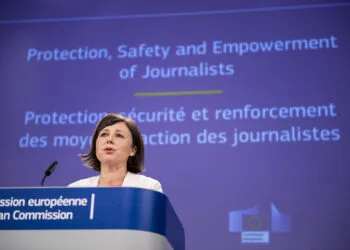Brussels – As with cohesion funds and the NRRP, money from the Common Agricultural Policy (CAP) would also be blocked to member states that do not respect Union values, fundamental rights, and the State of Law. Appealing directly to the EU executive, Finland and Sweden propose extending the conditionality mechanism to agricultural funds to protect the EU budget.
Last Monday (Sept. 23), the ministers for European Affairs in Helsinki and Stockholm, Joakim Strand and Jessica Rosencrantz, have sent a letter to the Commission in which they call for “a comprehensive approach” to protecting the rule of law in the EU, going in the direction of strengthening the legal equipment to be deployed in case of violations by member countries.
Therefore, the Scandinavians suggest that subsidies provided under the CAP, which represents a huge slice of the Union’s budget, should also be placed under strict conditionality: this is €386.6 billion over the period 2021–2027, out of a total of 2.018 billion (1.210 billion multi-year budget plus 808 from NextGeneration). Over the 2023–2027 period, Brussels has allocated more than 189 billion for direct support to farmers and businesses and 66 billion for rural development. That’s a lot of money, about a third of the EU budget (not counting Recovery).
Now, access to other European funds such as cohesion funds or, again in the Recovery theme, the financing of national NRRPs, has long been subject to a conditionality mechanism that requires respect for shared values (enshrined in Article 2 of the Treaty), of the Charter of Fundamental Rights and, indeed, of the key norms of the State of Law— constitutional principles underpinning liberal democratic construction such as the independence of the judiciary, media pluralism, protection of minorities, and so on.
The violation, ascertained by the Commission in agreement with the Council, of these values by a member state may result in the suspension or freezing of the funds as in the case of Poland, which under the PiS government had some 76.5 billion blocked (later “unfrozen” under Donald Tusk’s new administration), and Hungary of Viktor Orban, which still advances some ten billion from Brussels.
Therefore, Strand and Rosencrantz’s proposal is as simple as it is radical: extend this mechanism to all areas of EU budget intervention. “Instead of listening to calls to weaken conditionality on administrative grounds, we should strengthen rule-of-law conditionality,” the letter reads, because “our taxpayers need to have confidence that common EU funds are being used appropriately and responsibly.”
The call came on the eve of the General Affairs Council (GAC), held today (Sept. 24) in Brussels. During the meeting, the ministers of the Twenty-Seven discussed the situation of the rule of law in the EU in light of the report published last July by the Commission, which highlighted several criticalities in Italy and Slovakia and denounced the democratic erosion in Hungary as a “systemic problem.” The appeal was taken up, reading between the lines of what EU Justice Commissioner Didier Reynders said on the sidelines of the Council. Among the ‘to-do’s taken up by the EU executive is a promise to “establish a closer link between the recommendations of the rule of law report and the financial support given to member states under the EU budget.”
English version by the Translation Service of Withub







